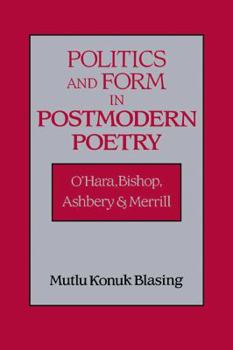Politics and Form in Postmodern Poetry: O'Hara, Bishop, Ashbery, and Merrill
(Part of the Cambridge Studies in American Literature and Culture Series)
Select Format
Select Condition 
Book Overview
Approaching post-World War II poetry from a postmodern critical perspective, this study challenges the prevailing assumption that experimental forms signify political opposition while traditional forms are politically conservative. Such essentialist alignments of forms with extra-formal values, and the oppositional framework of innovation versus conservation that they yield, reflect modernist biases inappropriate for reading postwar poetry. Biasing...
Format:Paperback
Language:English
ISBN:0521106133
ISBN13:9780521106139
Release Date:April 2009
Publisher:Cambridge University Press
Length:236 Pages
Weight:0.77 lbs.
Dimensions:0.5" x 6.0" x 9.0"
Customer Reviews
0 rating





